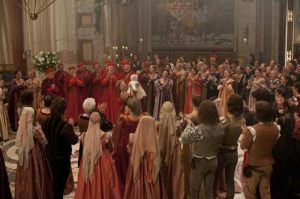Jeremy Irons, (“Reversal of Fortune”, “The Lion King”), stars as Rodrigo Borgia Pope Alexander Sextus in Showtime’s medieval drama, “The Borgias”. The second season was concluded with the most recent episode, “The Confession.” The season has covered several events of the historical Borgia account, from the invasion of King Charles VIII of France, played by Michel Muller, (“Hénaut Président”, “The High Life”), to the heresy of Girolamao Savanarola, performed by Steven Berkoff (“The Girl with the Dragon Tattoo”, “Forest of the Gods”). Even with the multiple storylines weaving forward, the season was able to focus strongly on the Borgia family and secondary characters, bringing them fully to life.
The finale was started in the last episode’s final moment- as Cesare, portrayed by François Arnaud (“Yamaska”, “I Killed My Mother”), ended his fraternal rivalry permanently. This carried into the main story- what happened to Alexander’s favorite son, Juan Borgia, played by David Oakes (“Pillars of the Earth”, “Trinity”), and who did it to him. Seeing Iron’s breaking from the loss to realizing who had done it was exceptionally moving. It was felt strongly in his counter-confession, explaining that favors he bestowed on Juan came so easily because Cesare was so like him. Then, to follow it with the laying to rest of his son; the scene- the music, the appearance, the contrast to the simultaneous events- is enough to move most anyone to tears.
 While “The Borgias” is a historical drama, it takes great liberties with the histories. The basis of the story, the mafia-esque nature of Pope Alexander Sextus, is taken from the viewpoints of his political rivals. While the rampant nepotism was the norm of the time, charges such as simony are largely undocumented. In contrast, Popes Urban VIII and Sixtux V declared him an outstanding pope. Truthfully, we can see reflections of this exultation or demonization of individuals in modern politics. Further, the creative liberties extend beyond the papal portrayal- time and events are modified. The Savonarola reformation and Roman response took place years after Juan’s death, meaning it could not be a factor in Cesare’s actions or forgiveness. Accuracies notwithstanding, “The Borgias”’s take on the Vatican’s drama of the late 15th century is masterfully done and wonderfully entertaining.
While “The Borgias” is a historical drama, it takes great liberties with the histories. The basis of the story, the mafia-esque nature of Pope Alexander Sextus, is taken from the viewpoints of his political rivals. While the rampant nepotism was the norm of the time, charges such as simony are largely undocumented. In contrast, Popes Urban VIII and Sixtux V declared him an outstanding pope. Truthfully, we can see reflections of this exultation or demonization of individuals in modern politics. Further, the creative liberties extend beyond the papal portrayal- time and events are modified. The Savonarola reformation and Roman response took place years after Juan’s death, meaning it could not be a factor in Cesare’s actions or forgiveness. Accuracies notwithstanding, “The Borgias”’s take on the Vatican’s drama of the late 15th century is masterfully done and wonderfully entertaining.
The second season of “The Borgias” comes to a close with a cliffhanger- the plot finally reaches fruition. The fraternal rivalry has ended, though a paternal schism may have appeared. Through it all, the majesty and dark recesses of medieval Rome come across vividly. It is a Rome of depth that is rarely seen from a time that the Eternal City is rarely shown. All in all, “The Borgias” is a beautifully done, both visually and audibly- which only serves to enhance the great storyline the fleshed out characters travel. If you crave outstanding drama, you will not be disappointed.
